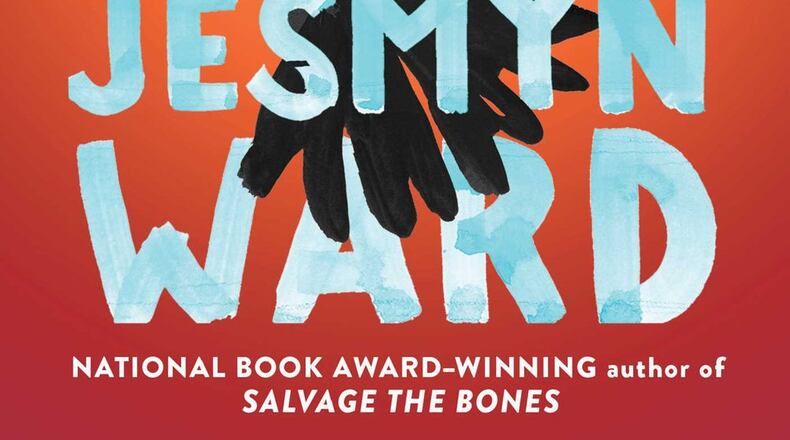A multitude of ghosts plague a poor Mississippi family in Jesmyn Ward’s macabre and musical new novel, “Sing, Unburied, Sing.” Its two main phantoms are the restless spirits of innocent black teenagers, but their similarities largely end there.
The ghost of Given Stone, as silent as his surname, appears to his sister Leonie every time she gets high. Leonie isn’t sure if Given really is a ghost, or just an amphetamine-induced hallucination. She never talks about seeing her dead sibling — a shame, because sharing this tidbit might help her young son cope with an even more nerve-racking haunting.
Jojo endures the endless moans of Richie, a kid who died decades earlier after escaping from a notorious prison. The same penitentiary is about to release Jojo’s father, Michael.
Ward, who grew up in rural Mississippi, landed the 2011 National Book Award for “Salvage the Bones,” another gut-wrenching tale of sacrifice and survival. Her latest novel, also nominated for a National Book Award, returns to Bois Sauvage, the setting of her previous two books, where Jojo and his baby sister are being raised by grandparents with unique gifts. Pop has a way with animals. Mam concocts herbal remedies for local women. Sadly, her voodoo organics can’t keep cancer from hollowing out her body.
The kids communicate without speaking, a skill that serves as a defense mechanism against their mother’s shocking cruelties. Leonie works nights at a bar, snorting painkillers and various other substances with her floozy friend, Misty.
Ward’s bayou backwater has been compared to Faulkner’s Yoknapatawpha County, an analogy that comes into sharper focus in a book that evokes “As I Lay Dying.” The novel’s overarching theme could be paraphrased in Faulkner’s famous observation, “The past is never dead. It’s not even past.”
The story begins on Jojo’s 13th birthday, when he’s “at that age where skinny boys either stretch and get skinnier and leaner and harder, or where skinny boys get fat.” Jojo has little risk for the latter, given Leonie’s tendency not to feed the kids for days at a time.
Upon hearing that Michael is getting out of prison, Leonie loads the children into her beat-up Malibu and sets off on a frantic journey to retrieve him. Misty comes along, which means meth is close behind. Frequent flashbacks help to fill in events that led to Michael’s descent into addiction after the explosion of the Deepwater Horizon offshore rig. “When his cheekbones started standing out on his face like rocks under water, I thought it was because he was stressed out over money,” Leonie recalls. “When his spine rose under the thin skin, a line of knuckles punching up his back, I thought it was because of his grief.” We also learn how grief brought the star-crossed lovers together soon after Given’s death.
In Ward’s previous novel, the heroine is fixated on Medea, the spiteful wife of Jason famous for her poor parenting skills. Leonie’s disturbing disregard for her children similarly echoes Greek myth, perhaps, but her journey makes her more of a Jason or Odysseus figure.
The author has a knack for capturing vivid details from contemporary poverty: skeletal houses covered in insulation paper, laborers on the prison farm “bent and scuttling along like hermit crabs.” Her lyrical language elevates desperation into poetic reverie. The metaphors for thirst and hunger are particularly strong. In passing along family folklore about an ancestor who had been kidnapped into slavery, Pop says, “In that village, they ate fear. Said it turned the food to sand in they mouth.”
The ominous food analogy is echoed in a passage that name-checks another literary ghost story, Toni Morrison’s “Beloved,” which also features an enigmatic supernatural character and a family drowning in unexpressed grief. A lawyer whose teeth are ringed with black “like a dirty bathtub” calls an urn on his mantle “my Baby, my Beloved.” It turns out to be his hiding spot for narcotics. When Leonie opens the urn, Michael looks “like I am holding his favorite food, macaroni and cheese, and he wants to eat.”
Readers may be tempted to gulp down the novel’s passages in monster-sized bites. But this book is easier to digest in nibbles, with chapters rationed out like the salty crackers Jojo shares with the baby during their anxious road trip.
In complaining about her father’s storytelling, Leonie says, “I used to have to piece the things he told me together to get the whole picture.” The same observation might apply to Ward’s narrative style, which can require some effort to absorb.
Ward delights in bingeing on metaphor — things get trippy once ghostly Richie starts communing with a shape-shifting serpent — to the detriment, at times, to clarity and plot.
The novel’s lyricism most notably works against itself in interior monologues that can be unconvincing. As much as we admire Pop, it’s pretty difficult to imagine him uttering sentences like, “It was the only way I could untether my spirit from myself, let it fly high as a kite in them fields.” And though we believe Leonie when she confesses that, “it feels good to be mean,” the character’s self-awareness doesn’t really resonate with her selfish, vindictive nature.
Still, there’s plenty to admire about “Sing, Unburied, Sing,” a gripping and melodious indictment of modern racial injustices.
FICTION
‘Sing, Unburied, Sing’
By Jesmyn Ward
Scribner
304 pages, $26
About the Author
Keep Reading
The Latest
Featured


